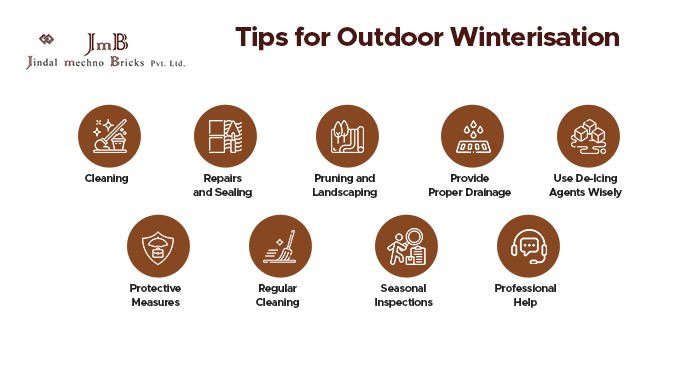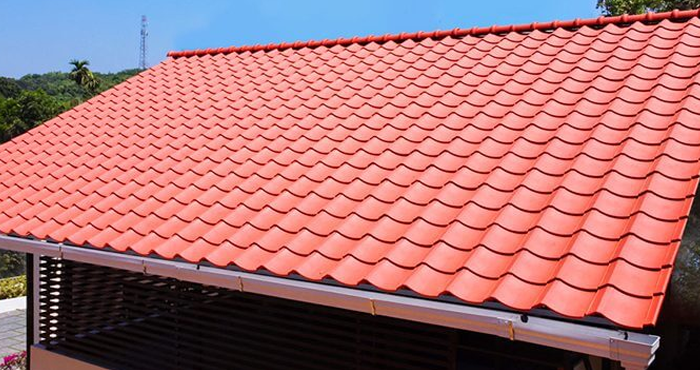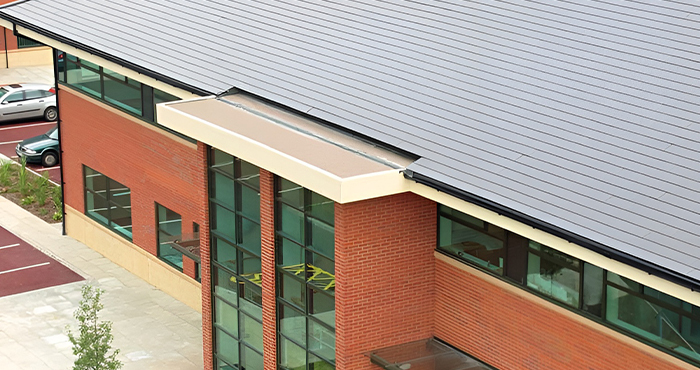As the chilly winds start to sweep in, it’s time to turn our attention to preparing our outdoor spaces for the winter months. One crucial aspect often overlooked is the care of our outdoor paving. Proper outdoor paving winterisation ensures its longevity and helps maintain its beauty.
This article shares some easy-to-follow paving winterisation tips that can help you maintain outdoor paving effectively.
Why Outdoor Paving Winterization Matters
Your outside space will look nicer as well as function better with outdoor paving, whether it’s a beautiful stone sidewalk or a large patio. But harsh winter weather can have an adverse effect on these surfaces, causing fractures, stains, and general wear and tear. Winterisation keeps your outdoor spaces in excellent condition year after year while protecting your investment.
Tips for Outdoor Winterisation
So let’s start with some fantastic paving winterisation tips that will help keep your outdoor pavers tiles beautiful and protective.

Cleaning: Give your outside paving a thorough cleaning before winter arrives. Clean up any dirt, leaves, and trash that may collect and retain moisture. In order to get rid of any stains, oil spills, or grime, use water and a mild detergent.
By taking this step, you can be confident that your paving is free of impurities that can exacerbate in below-freezing temperatures.
Repairs and Sealing: Look for any cracks, chips, or loose stones in your outside paving. By taking care of these problems before winter sets in, you can stop the freezing and thawing cycles from making them worse.
Additionally, think about using a suitable sealant to seal your paving. By preventing moisture from penetrating, sealing reduces the possibility of cracking and discolouration.
Pruning and Landscaping: Cut back any bushes or trees in the area if you don’t want their branches to hang over your patio or driveway. Icicles, snow, and falling leaves can do damage. With proper landscaping, the risk of moisture buildup is reduced, and less waste ends up on your paving.
Provide Proper Drainage: To stop water from collecting on your outdoor paving, it’s essential to provide proper drainage. Standing water has the ability to freeze, expand, and cause erosion or cracks. To avoid this problem, make sure that your paving is slanted away from buildings and towards drainage areas.
Use De-Icing Agents Wisely: De-icing solutions can be beneficial for preventing slips and falls, but if applied carelessly or excessively, they might harm your outdoor surface. Select a secure de-icing product for the particular paving material you are using. Avoid using rock salt, as it can corrode and damage the surface.
Protective Measures: During the winter, think about placing rubber or plastic mats in high-traffic places like doors and pathways. These mats add an extra weatherproofing layer and help keep harsh substances from harming your pavers.
Regular Cleaning: You should regularly clean your outside paving, even in the winter. To stop snow, dirt and debris from building up and causing harm over time, sweep them away.
Seasonal Inspections: Before and after the winter, regularly evaluate your outside paving tiles. Check for any indications of deterioration, cracking, or relocation. Quick action can stop problems from getting worse and ultimately save you money.
Professional Help: If you’re not sure about the appropriate winterisation techniques for your particular paving material, consider talking to an expert. A pavers tiles specialist can offer customised guidance and carry out required upkeep to maintain the durability of your outdoor paving tiles.
Conclusion
The longevity and overall beauty of your outdoor paving can change significantly as winter approaches if it is properly winterised. You may appreciate the beauty of outdoor paving for many years to come, regardless of the weather, by following simple instructions and implementing essential paving maintenance tips.
So if you are looking for high-quality outdoor floor paving tiles, Jindal Mechno Bricks is here to help. We are the famous brick manufacturers in India, delivering high-quality building materials. Contact the team to know more.
FAQs
1. Why is outdoor paving winterisation important?
Winterisation is crucial for outdoor paving because harsh winter conditions can lead to cracks, stains, and deterioration. Proper care ensures your paving’s longevity and helps maintain its aesthetic appeal, saving you from costly repairs or replacements.
2. Can I use rock salt to de-ice my outdoor paving?
It’s advisable to avoid using rock salt on your outdoor paving. Rock salt can corrode and damage the surface, leading to cracks and deterioration over time. Instead, opt for de-icing products that are safe for your specific paving material, and use them sparingly.
3. How often should I clean my outdoor paving during winter?
While regular cleaning is essential, you don’t need to clean your outdoor paving every day during winter. Aim to sweep away snow, debris, and dirt periodically to prevent them from accumulating. This will help maintain the integrity and appearance of your paving throughout the colder months.
4. Is it necessary to seal my outdoor paving before winter?
Sealing your outdoor paving before winter is a wise preventive measure. A quality sealant creates a protective barrier that shields your paving from moisture penetration, reducing the risk of cracks and stains. Consult a professional to determine if sealing is appropriate for your specific paving material.
5. What should I do if I notice cracks in my outdoor paving after winter?
If you notice cracks in your outdoor paving after winter, it’s important to address them promptly. Cracks can worsen over time due to freezing and thawing cycles. Contact a paving expert to assess the damage and recommend the best course of action, whether it’s repair or replacement, to ensure the longevity of your outdoor paving.





